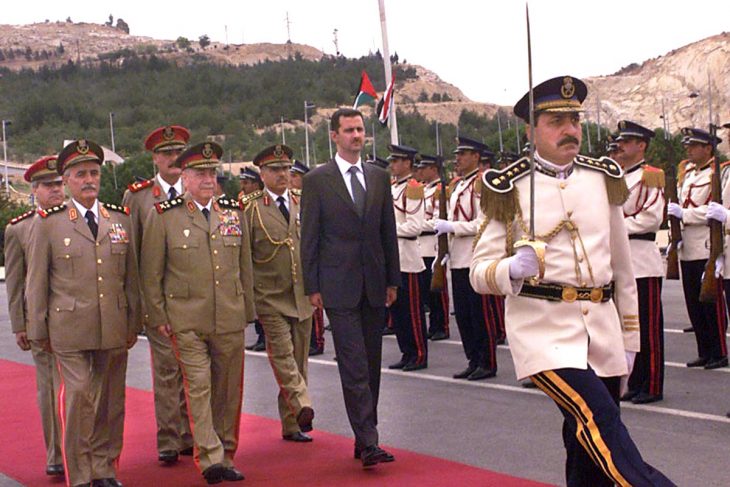Josef was 13 years old in 2011 when he led schoolmates to participate in the protests of the fledgling Syrian revolution in Aleppo. He was 13 when he was arrested for the first time by the mukhabarat, the Syrian intelligence services. This first detention was followed by two others in the following years, while the demonstrators were still marching under the bombs and he was helping to get the survivors out of destroyed buildings.
A refugee in Austria since 2015, Josef is one of those survivors who are now going after the architects of Syria's repressive system from Europe. When he was contacted to give his testimony by Syrian lawyer Anwar Al-Bunni, lynchpin of these lawsuits, he did not hesitate. "It was a way to continue the fight against the regime and to support the prisoners still languishing in Syrian jails, so that they are not forgotten," he explains.
Complaint against 24 senior officers
In 2018, along with fifteen other survivors including an Austrian national, he filed a complaint in Vienna against 24 senior officers of Bashar Al-Assad's regime for torture and crimes against humanity, with support from the Syrian Media Centre for Media and Freedom of Expression, the Syrian Centre for Legal Studies and Research, the European Centre for Constitutional and Human Rights (ECCHR) and the International Centre for Human Rights Enforcement (CEHRI), an Austrian organization. This case echoes other similar complaints filed in Germany in 2017, and then in Sweden and Norway in 2019, with the support of the same associations.
Nearly three years later the investigation, opened in the wake of the complaint, continues. "The investigation is taking time, because of the magnitude of the case, but also because the main suspects are not present on Austrian soil," says Tatiana Urdaneta Wittek, lawyer and member of CEHRI. Moreover, unlike Germany, Sweden or France, Austria has neither a dedicated international crimes unit within the public prosecutor's office nor a specialized police team. Only one prosecutor deals with Syrian cases, in addition to other national cases.
Investigations possible in suspects’ absence
Austria was a pioneer in the field of extraterritorial jurisdiction, prosecuting a Bosnian guard, Dusko Cvjetkovic, for genocide in 1994. This trial, which ended in an acquittal, was the very first abroad for crimes committed in former Yugoslavia. Extraterritorial jurisdiction, at the time, was essentially based on the obligation to prosecute under Austria’s international commitments in the conventions governing these crimes. Vienna has since adopted the principle of universal jurisdiction over acts of torture, first in 2012 and then by incorporating the international crimes defined by the Statute of the International Criminal Court into its criminal code in 2015.
“It took several steps, until 2015, for Austria to completely adapt its criminal code in order to be able to prosecute, at the national level and by virtue of universal jurisdiction, every crime defined by international law”, explains researcher Astrid Reisinger-Coracini, a member of the CEHRI. "However, this does not prevent the prosecution of such crimes committed before that date, by other legal means."
Austria's universal jurisdiction is not "absolute" as in Germany or Sweden. It can prosecute such crimes "if the perpetrator or the victim is an Austrian national, or the offence has infringed on other Austrian interests, or the perpetrator was a foreign national who either has his or her place of habitual residence in Austria or who is present in Austria and cannot be extradited," explains magistrate Christine Gödl at the Ministry of Justice's international criminal justice department. But while the presence of the alleged perpetrator is a sine qua non for any indictment - no trial can be held in absentia - nothing prevents the public prosecutor's office from investigating, even in the suspects’ absence from Austria, and from issuing international arrest warrants.
Indeed, this was an objective of those who filed the complaint in 2018. The victims and organizations that support them expect Austria to follow in the footsteps of France and Germany, whose public prosecutors have issued international arrest warrants for Ali Mamlouk, head of Syrian national security, and Jamil Hassan, former commander of air force intelligence. Vienna could follow suit, hopes Urdaneta Wittek: "The prosecutor's office has done important work in recent months and we are confident that the Austrian authorities will in turn issue such arrest warrants."
“Justice can be therapeutic”
“Justice can be therapeutic," says the lawyer. “This is one of the pillars of CEHRI’s multidisciplinary approach, where we support the victims on a legal level but also on a medical, psychological and social level. Legal procedures that respect their well-being are a step towards the recognition of the crimes they have suffered, and thus access to rehabilitation and reparation. But all this is only possible if the investigation proceeds without unnecessary delay, if their testimony is heard by the prosecutor in a sensitive manner, and if arrest warrants are issued against the perpetrators."
When asked why he got involved in such a court case, Josef says: "It's not about me. It's about doing the right thing. I can't be content with just living my life while the dictatorship in Syria continues. These complaints, these trials in Europe are important, because it is a way to show the Syrians who are still there that they are not alone, that Europe has not completely abandoned them." For the young man, the recent conviction in Koblenz, Germany, of a Syrian intelligence officer is a first victory: "It is a message sent to Bashar Al-Assad. The revolution is not dead, our ideals of justice and democracy are alive and well. And one day, it will be his turn to face justice." In the meantime, it is the duty of European justice to prosecute the torturers, he believes.
Suspected perpetrator protected?
Yet in 2018, Austria was accused of having protected a man suspected of multiple exactions. Khaled Al-Halabi, a former high-ranking member of the mukhabarat, had been a refugee in Vienna for several years, according to a long investigation by the daily Kurier. From 2009 to 2013, the brigadier-general was head of the Syrian intelligence branch 335, in Raqqa, which arrested and tortured dozens of protesters, according to the Commission for International Justice and Accountability (Cija), an NGO that specialises in investigating and gathering evidence of international crimes. In March 2013, at a time when the Raqqa region was gradually falling into the hands of rebels and various Jihadist groups, he reportedly fled to Turkey and then Jordan. In February 2014, he flew to Paris, where he stayed for a year and applied for asylum. But the French Office for Refugees, already, suspected him of serious violations of international law.
According to the Kurier, this is where the BVT, the Austrian intelligence service, came into play. Relying on dozens of internal documents, the daily claims that the BVT agreed to take in the former brigadier-general in Austria at the request of Mossad, the Israeli intelligence service, which itself organized his exfiltration from France -- an operation called "White Milk" in the documents presented by the Kurier. According to the Austrian daily, in late spring 2015, Al-Halabi disappeared from French territory and reappeared in summer 2015 in Vienna, where he obtained refugee status in the record time of less than six months, as well as an apartment and state benefits. In many ways, the case remains mysterious, and the reasons for Mossad's supposed interest in the Syrian brigadier-general remain unknown for now.
In early 2016, the CIJA reported to the Austrian judiciary the presence on its territory of this man, that it suspects of torture and crimes against humanity, and sent the prosecutor's office a thick dossier of evidence and testimony against him. As a result, the prosecution opened an investigation. But Al-Halabi was, it seems, not questioned… until 2018. At the same time, French justice, which meanwhile received the general’s file from the asylum services, launched an alert via Europol to try and track him down. The CIJA transmitted new evidence to the Austrian prosecutor's office. But when, in November 2018, the police were finally sent to the Syrian's home, he had disappeared.
The revelations in the Kurier have led to a resounding national scandal. An investigation for abuse of power, targeting senior officials of the Austrian intelligence and asylum services, has been opened at the prosecutor's office in Vienna. According to our information, while Al-Halabi’s location is unknown for the moment, the investigation of his case is ongoing in Austria. Several victims of Branch 335 have provided testimony to the prosecutor, supported since 2019 by CEHRI and the international organization Open Society Justice Initiative.
“Perpetrators of crimes committed in Syria must be prosecuted in a coordinated manner in Europe”, strongly believes Urdaneta Wittek, “and for the moment this is the only way to fight against their impunity”. For the survivors, she says, it is a beginning of recognition, a possibility to rebuild.






